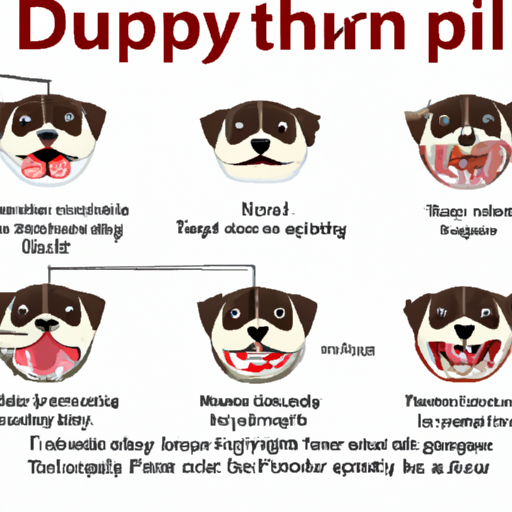Introduction
Welcome to a comprehensive guide, dear caregiver, that will help you understand the different stages of puppy teeth development. It’s an exciting journey, and with the help of vivid pictures, we can walk through this process together.
Stage One: No Teeth (0-2 weeks)
During the first two weeks of your puppy’s life, they will not have any teeth. They will rely entirely on their mother’s milk for sustenance. This stage is crucial for their development, but there are no teeth to be seen at this stage.
Stage Two: Baby Teeth Eruption (2-4 weeks)
Now, your puppy starts to develop their baby teeth, also known as deciduous teeth. These teeth are small, sharp, and perfectly designed for a diet of milk. Here’s a snapshot to help you identify these little white points:
Stage Three: Full Set of Baby Teeth (5-6 weeks)
By the time your puppy is between 5 to 6 weeks old, they should have a full set of baby teeth. This includes 28 teeth in total, broken down as follows:
| Teeth Type | Quantity |
|---|---|
| Incisors | 12 |
| Premolars | 12 |
| Canines | 4 |
This is a perfect time to introduce soft puppy food to their diet.
Stage Four: Transition to Adult Teeth (12-16 weeks)
The transition from baby teeth to adult teeth begins around 12 weeks. You’ll notice that their baby teeth start to fall out, and their gums may appear swollen or red. Do not panic, as this is a normal part of the process. Here’s what you can expect to see:
Stage Five: Full Set of Adult Teeth (6-7 months)
By the time your puppy reaches 6 to 7 months old, they should have a full set of adult teeth. This consists of 42 teeth, which can be categorized as follows:
| Teeth Type | Quantity |
|---|---|
| Incisors | 12 |
| Premolars | 16 |
| Canines | 4 |
| Molars | 10 |
Now, your puppy is capable of having a diet that includes a variety of foods.
Dental Care for Your Puppy
Just like humans, dogs require dental care to keep their teeth and gums healthy. Here are some steps you can take:
- Regular brushing: Use a dog-specific toothpaste and brush.
- Dental chews: These can help clean your puppy’s teeth.
- Regular vet checks: Your vet can spot potential dental issues early.
FAQs
Q1: When should I start brushing my puppy’s teeth?
Start brushing your puppy’s teeth as soon as they have fully grown their set of baby teeth, around 6 weeks old.
Q2: What should I do if my puppy’s tooth falls out?
It’s normal for puppies to lose their baby teeth, much like humans. If it happens, there’s no need to panic. However, you should always ensure that your puppy is not in any discomfort.
Q3: How can I help my teething puppy?
Provide your puppy with teething toys. These are designed to soothe their gums and can help distract them from the discomfort.
Q4: What should I do if my puppy still has baby teeth at 6 months?
If your puppy still has their baby teeth at 6 months, you should consult with a vet. They may need to be removed to make room for the adult teeth.
By understanding the stages of puppy teeth development, you’re in a great position to provide the best possible care for your new pet. Enjoy this journey with your little one!




